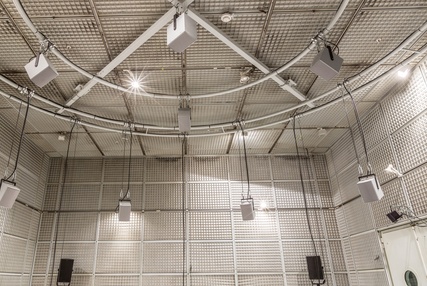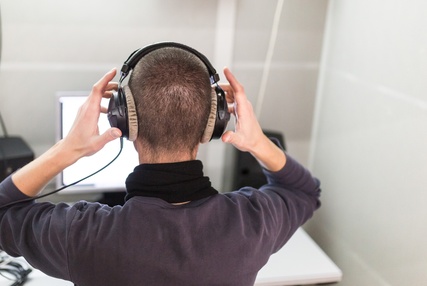10h00- 17h30
Français
Perfectionnement
Tarif plein
:
1650 €
Mbre Forum Premium
:
1155 €
Étudiant.e
:
825 €
Max est un logiciel de programmation graphique qui permet de traiter, de générer, et d'interagir avec des données MIDI, des flux audio, vidéo, ou tout autre type de données, comme celles provenant de capteurs.
![]()
Objectifs pédagogiques
À l'issue de la formation, les stagiaires auront acquis des compétences de programmation avancées dans Max, et une connaissance solide de ses fonctionnalités multicanales. Ils ou elles seront capables de réaliser des patchs complexes et de choisir les outils software et hardware adaptés à leur projet utilisant Max.
La formation est suivie par un examen pour l’obtention du certificat Ircam Max niveau 2 : un test d’évaluation du niveau d’utilisation du logiciel Max en situation professionnelle.
Public concerné
Toute personne créative ayant un socle de connaissances de base sur Max et souhaitant monter un projetnécessitant l'utilisation de Max : compositeurs, compositrices, développeurs, développeuses, interprètes, techniciens et techniciennes du son, chorégraphes, créateurs et créatrices sonores, vidéastes, live-codeurs, live-codeuses, enseignants et enseignantes en musique ou en arts plastiques, "makers", chercheurs et chercheuses dans le domaine de l'informatique musicale...
Prérequis
- Avoir un socle de connaissances et de compétences suffisant sur Max et son environnement ou avoir suivi le stage Max Initiation, et avoir une pratique régulière du logiciel.
- Bonne connaissance d'un séquenceur logiciel (station de travail audio-numérique DAW) tel que Pro Tools, Logic, Reaper, Ableton Live ou autre et d'un logiciel d’édition audio (WaveLab, SoundStudio, Audacity, Adobe Audition...).
- Bonne maîtrise du vocabulaire anglais utilisé dans les logiciels usuels;
- Maîtrise des principales fonctionnalités de l'ordinateur Macintosh (connaissance et manipulation du clavier et de la souris, créer et gérer des fichiers et des dossiers, naviguer dans les menus, lancer une application).
- Des notions élémentaires en mathématiques faciliteront la compréhension : nombres entiers, rationnels et décimaux, addition, soustraction, multiplication, division, valeur absolue, étude de fonctions trigonométriques simples.
En amont de cette formation, il est conseillé aux stagiaires d'avoir réalisé la série de tutoriels présents dans le logiciel, ou de justifier par sa pratique de Max des connaissances correspondantes.
Durée de la formation et modalités d’organisation
36h, du lundi 9 au samedi 14 février 2026, 10h-13h et 14h30-17h30
10 stagiaires maximum
Au cas où ils ne pourraient avoir lieu en présentiel, la formation et le passage du certificat Ircam ne pourront pas être maintenus.
Programme de la formation
Attention, Jitter ne sera pas abordé.
Certains détails du programme de la formation peuvent être modifiés en fonction des évolutions des logiciels utilisés.
Lundi
| Matin | Récapitulatif des types de données dans Max. Structures de données (listes, <coll>, <dict>). Utilisation approfondie des structures de données pour la collecte et restitution de paramètres et de trajectoires : <coll>, <zl>, <expr>, <vexpr>, <nodes>. |
| Après-midi | Rappels et mise en œuvre d’une architecture comme base de développement généralisé : entrée, sorties, mixage (« dry/wet »), crossfade, panoramique stéréo et quadriphonique. Modularité et encapsulation, éléments essentiels d'un patch type "concert", interface, procédures d'initialisation. Développement d'un patch type "concert". |
Mardi
| Matin | Introduction à la polyphonie et généralisation poly-procédurale dans MAX: <poly~>. Parallélisme et polyphonie : exemples pratiques, synthèse additive, synthétiseur polyphonique. |
| Après-midi | Introduction aux fonctionnalités multicanaux (MC). Application à la synthèse additive. Réalisation d’un « player » audio polyphonique. |
Mercredi
| Matin | Approfondissement et application à la réalisation d’un échantillonneur ("sampler") polyphonique et d'un synthétiseur granulaire via l'usage de <poly~>. |
| Après-midi | Gestion des flux audio par matriçage (<matrix~>, <matrixctl>…) et intégration dans une architecture de développement. |
Jeudi
| Matin et après-midi | Connaître les principes et les applications des traitements dans le domaine fréquentiel : séries de Fourier, transformée de Fourier et FFT. Développement de traitements dans le domaine fréquentiel grâce à la transformée de Fourrier discrète à court terme (STFT) : utilisation de <pfft~>, de ses abstractions et objets spécifiques. Mise en pratique : filtrage, convolution et synthèse croisée, delay "spectral". |
Vendredi
| Matin et après-midi | Développement bas niveau dans Max : découverte de l'extension <gen~> et de ses contextes d'application. Mise en pratique : traitements, synthèse par modèle physique, banque de résonateurs, MC Gen~. |
Samedi
| Matin | Approfondissement et révisions. |
| Après-midi | Examen. |
Moyens pédagogiques et techniques
- Salle de formation équipée d’ordinateurs Mac mini avec les logiciels utilisés, de casques audio et de claviers MIDI.
- Format de la formation : la formation alterne entre des exposés théoriques, l'étude d'exemples à analyser et des travaux pratiques.
- Supports pédagogiques : des présentations vidéo-projetées. Un support de cours sera remis au début de la formation et des fichiers complémentaires seront fournis au fur et à mesure.
Les environnements Max et Ableton Live ne sont pas inclus dans le tarif de la formation et ne sont pas fournis à l’issue de la formation.
Suivi
- Accueil le premier jour de la formation à partir de 9h45.
- Contrôle du suivi par la signature d’une feuille de présence pour chaque demi-journée.
- Remise d’un certificat de réalisation et des résultats de l’évaluation.
.Évaluation
- Examen de certificat Ircam Max niveau 2 passé à l’issue de la formation. Test de connaissances sous forme de questions-réponses et exercices / cas pratiques (3h)
Certificat Ircam - Max niveau 2
3h, samedi 14 février 2026, 14h30-17h30
11 stagiaires maximum
L’examen de certificat Ircam se compose de deux parties (1h30 chacune) :
- Un test de connaissances sous forme de questions-réponses (questions ouvertes et commentaires de captures d'écran) ;
- Après une pause, une série d'exercices place les candidates et candidats face à plusieurs cas pratiques concrets, dont la difficulté est croissante. Il doit penser et concevoir des solutions, comme s'il était en situation professionnelle (test sur ordinateur Mac, avec le logiciel Max).
L’examen n’est pas une évaluation du suivi du stage mais un test d’évaluation du niveau d’utilisation du logiciel Max en situation professionnelle.
Le jury, composé d’un formateur ou d’une formatrice, réalisateur.trice en informatique musicale chargé.e de l'enseignement à l'Ircam et d'un ou d’une spécialiste du logiciel, évaluera les 3 critères principaux suivants :
- Théorie : restituer des connaissances portant sur le logiciel Max et son environnement (vocabulaire du système MIDI et audio, conventions de programmation).
- Analyse : analyser et interpréter le fonctionnement de programmes Max, et proposer des solutions de « debugging ».
- Application : appliquer ces connaissances et compétences à travers la conception et la réalisation de programmes Max interactifs aux spécifications précises.
Un certificat avec indication des résultats sera remis aux participants 3 semaines après le passage de l’examen.





